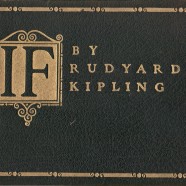
Besides great summertime reading, I’d say that Rudyard Kipling’s poem ‘If’ qualifies him as the poet laureate of life sciences and innovation.
Back in the days when King Edward VII ruled the once-mighty British Empire, Kipling’s inspirational poem ‘If’ was published in 1909. ‘If’ proved so exceptional in touching the soul of the British reader that, even in the mid-1990’s, Brits voted ‘If’ as their all-time favourite poem. ‘If’ is inspirational and gives us a clue as to what actual leaders need to do – to inspire one to persevere, sometimes against long odds; to believe in one’s self and those around you.
‘If’ nicely captures the struggles in the life sciences, be it biotechnology, pharmaceuticals or medical devices (I missed a few sectors; apologies). The life sciences may be a lucrative area for innovation but nothing comes easy in the life science innovation as new inventions are hard to commercialize, Money proves scarce until an invention becomes an practical innovation and thus displays the necessary evidence worthy of financial support. Sometimes greater time is spent searching for investments than the actual innovating itself.
Kipling teaches us about leadership, patience and perseverance. His own difficult life is reflected in this poem and emphasizes the need for hard work and staying focused. Luck helps (seems to work better in the movies) but the innovator’s personality craves the unknown and looks failure in the face as easily as the face of success. Both are the primary drivers built into the DNA of both the life science inventor and the innovator.
Innovators always ask what Kipling asked. What ‘If’ this is possible? What ‘If’ my idea works? Wise Innovators also know to ask that other important ‘If’ question – What ‘If’ I can make this commercially successful. This last ‘If’ question requires even greater team work (bring on the VC’s, the Angels, the partnering and licensing … etc.) to get the right answer.
You can read the entire ‘If’ below as well as watch the neat video of it on Vimeo. Note that, as it was written over a century ago, the last line in particular needs some updating to reflect today’s more gender-balanced reality. See my recommendation in brackets, below that line; you can add your own if you like.
For life sciences innovators, “giving up” are just the words needed to keep going. In my books, Kipling is the Poet Laureate of Life Science Innovation. If you have your own inspirational literature, let’s hear it, as we could all use an ample daily dose of inspiration.
Marenon short link http://wp.me/p1yRfA-e5
Vimeo link http://vimeo.com/1305608
‘ If ‘
by Rudyard Kipling (1865 – 1936)
If you can keep your head when all about you
Are losing theirs and blaming it on you,
If you can trust yourself when all men doubt you,
But make allowance for their doubting too;
If you can wait and not be tired by waiting,
Or being lied about, don’t deal in lies,
Or being hated, don’t give way to hating,
And yet don’t look too good, nor talk too wise:
If you can dream – and not make dreams your master,
If you can think – and not make thoughts your aim;
If you can meet with Triumph and Disaster
And treat those two impostors just the same;
If you can bear to hear the truth you’ve spoken
Twisted by knaves to make a trap for fools,
Or watch the things you gave your life to, broken,
And stoop and build ’em up with worn-out tools:
If you can make one heap of all your winnings
And risk it all on one turn of pitch-and-toss,
And lose, and start again at your beginnings
And never breathe a word about your loss;
If you can force your heart and nerve and sinew
To serve your turn long after they are gone,
And so hold on when there is nothing in you
Except the Will which says to them: “Hold on!”
If you can talk with crowds and keep your virtue,
Or walk with kings – nor lose the common touch,
If neither foes nor loving friends can hurt you,
If all men count with you, but none too much;
If you can fill the unforgiving minute
With sixty seconds’ worth of distance run,
Yours is the Earth and everything that’s in it,
And – which is more – you’ll be a Man, my son!
(And – which is more – you’ll be an Innovator, helping your fellow man!)




